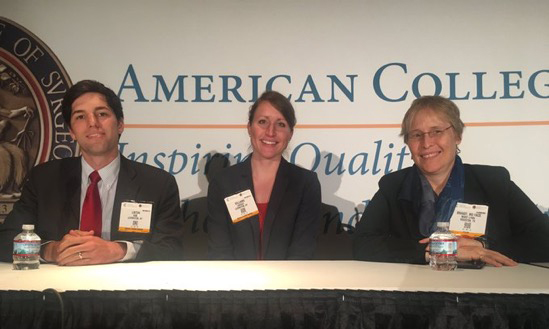UK medical students debunk “millenial” myths at ACS Clinical Congress
In a panel presentation at the Clinical Congress of the American College of Surgeons last October, two UK medical students talked about how their generation values immediate and constructive feedback and a “sense of belonging” in the surgery clerkship experience.
Lindsay Williams and Samuel Linton, serving their 3rd year surgery clerkship at the University of Kentucky College of Medicine, participated in the podium panel presentation with Dr. Joseph Iocono, division chief of UK pediatric surgery, and Dr. Mary L. Brandt, pediatric surgeon and director of the William J. Pokorny Fellowship at Baylor University in Houston, Texas.
The panel presentation, Mythbusters: Demystifying the 3rd Year Surgical Clerkship, addressed the misleading stereotypes of educating the so-called “millenial” generation. The presentation was selected from hundreds of submissions at the ACS Clinical Congress in Washington, DC on October 19.
Dr. Iocono opened the discussion with a talk about the challenges of teaching a generation that had grown up with so much information and technology at hand. Dr. Brandt ended the discussion by noting the advantages and positive aspects of teaching the art of surgery to the current generation.
But according to Dr. Iocono, it was Williams and Linton’s leg of the presentation that formed the foundation for most of the discussion. The UK students addressed the 3rd year clerkship from the perspective of the present generation, describing assumptions some professors make about medical students based on the millenial stereotype and the unintentional friction that it can cause. They also talked about common errors and assumption that millenials make about residents and older generation surgeons.
Survey results identified several issues and topics that merited discussion and reflection. Two common observations which came up in relation to best and worst clerkship experiences, were the following:
- The students’ sense of being included or involved with the resident or attending.
- Receiving constructive or critical feedback from residents or attendings within a reasonable amount of time.
Supporting data was collected via survey of surgery professors, residents, and 3rd year medical students. Williams and Linton picked up the thread of work that had been started a year earlier from two former UK students. For several months, they met with Dr. Iocono weekly to review survey results, conducted background research, and assimilated the data into a powerpoint presentation.
Click here to review the Powerpoint presentation.
“The presentation went really well,” Williams commented. “It was an incredible opportunity to get in front of a crowd like that ... and field questions specifically geared toward Sam and me. People did want to hear what medical students had to say about educating millenials in surgery.”
“It was interesting to see what issues were being talked about on a national level,” Linton said with regard to the entire clinical congress experience. “I recommend the experience to any medical student, just to understand the broader topics being addressed in continuing surgical education. It would be interesting to incorporate some conference webcasts into the 3rd year curriculum.”
